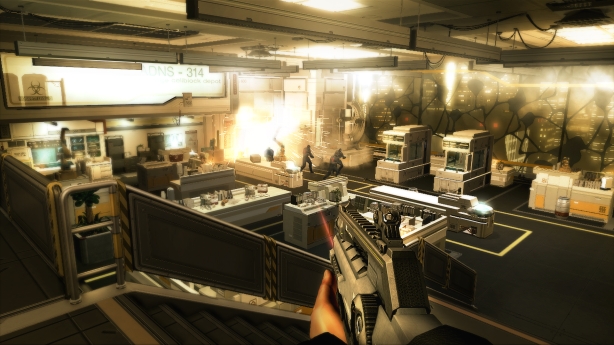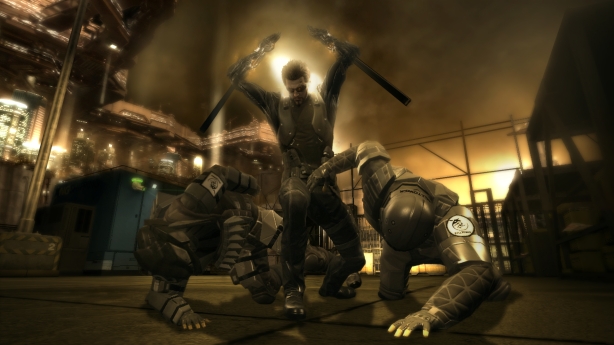Deus Ex: Human Revolution Review
 Game: Deus Ex: Human Revolution
Game: Deus Ex: Human Revolution
Developer: Eidos Montreal
Publisher: Square Enix
Available on: Xbox 360, PlayStation 3, Windows PC (PlayStation 3 version reviewed)
Our universe began with an explosion and in the first few seconds of existence, it was incredibly dense, full of every atom of matter that would spread through space over billions of years to become the cosmos we inhabit today. Most modern games exist much like the universe as it exists now; beautiful, exciting and full of life, but much of it spread out and untouchable, there to be admired but never truly interacted with.
Deus Ex: Human Revolution is our universe, but when it was new. Dense, all consuming and packed tight, everything close together, to be touched and crucially, to be sculpted. Deus Ex, as the title would suggest, desires to give the player the power to shape the world as they see fit.
This promise of godhood is an enticing one but, so often, one that it is not within the power of the developer to deliver. Can Deus Ex Human Revolution really put the universe in the player’s hands?
STORY: Deus Ex is crammed full of detail. Millions of words of dialogue and text have gone into creating one of the most cohesive universes in gaming history. The world of Human Revolution tips its cap to the original Deus Ex, Blade Runner and any number of dystopian sci-fi touchstones, leaving an incredibly rich and vividly realised world in which a convoluted story of corporate espionage, runaway technology and scrambles for power can unfold wonderfully in front of you.
This overarching story is beyond the influence of the player, but inside this main story is a mesh of interactions, side quests, discussions and revelations where the player has total control over shaping the world. It is here that the player really creates their own universe, with cause and effect moulding the game’s sub-plots. Side quests, which are elaborate and consistent with Jensen’s established position as an ex-SWAT security chief (he is never reduced to the level of errand boy), do much to fill out the backstory and establish the kind of protagonist the player wants Jensen to be.
It is only when returning to the main plot that this feeling of total control is broken. The game is punctuated by boss fights and situations that are totally unavoidable. The feelings of free will, choice and influence that the writing team worked so hard to generate tumble out of the window as the player is funnelled into confrontations with clichéd boss characters. Not only do these moments break the sensation of the game world and the story, they also feel clunky and old-fashioned. The immersion of the world is broken only fleetingly, but it is enough to hint at the true structure of the story and remind the player that this is just a game.

GRAPHICS: In Hengsha (Deus Ex’s second hub city), to truly appreciate the visuals of Eidos Montreal’s game, all you have to do is look up. The two-tier city, seen in all of the early trailers for the game, is one of the standout graphical moments of Deus Ex. Not because it is an astonishing technical achievement or obvious visual showcase, rather it highlights wonderfully the depth to which the game has you immersed. Seeing the underside of the upper tier, it is difficult not to imagine the affluence and ostentation of the people walking above, sunlight warming their face, instead of the cold neon and clutter of the Lower Hengsha streets which where Adam Jensen has to work. It succeeds because the city Eidos Montreal has created oozes detail.
Every area of the game looks unique, but all are chock-a-block with visual clues and intricacies, from a scrawled post-it note revealing a computer password to unique gang-graffiti telling the player who owns which territory, the team at Eidos Montreal have done a superb job of giving every room, every alley and every shop-front a personality. Non-playable characters are given the same courtesy; rarely does the player get the sensation they are looking at identikit clones, with a huge variety of faces dotted around the game’s vast levels creating a wonderful illusion of meeting new people around every corner.
This concern with density, of filling every screen with as much information and detail as possible, is what defines the visuals of Deus Ex. There are few (if any) vantage points that provide vacuous views across a distant, non-existent cityscapes. However, every time the player turns their head there could be some vital clue, an interesting character or a bafflement of information to absorb, all of which anchors them firmly in the now, focussing them entirely in the world that they can affect.
Technically, the graphics can be a little clumsy. Lip sync is frequently haphazard, although this is forgivable and almost to be expected when one considers the sheer volume of dialogue included in the game. Equally, the cinematics that link key scenes and fill out the story at the game’s occasional choke points look decidedly low rent, calling to mind the FMV one would expect from a PlayStation 2 game. They just aren’t the visual payoffs that you would expect from a modern game, and as the only moments where the player isn’t in direct control of Jensen, can serve to snap you out of a game world whose greatest strength is its ability to hold onto you by the throat.
SOUND: Deus Ex is a cacophony. A beautiful, symphonic cacophony that startles and awes in the same way that a trip to Times Square does, by grabbing hold of your senses and not letting go.
Wherever the player chooses to wander they are bombarded by sound. Conversations are overheard, air-conditioners buzz and cities hum to their own tune. It is a wonderful sensation, one that effectively recreates the feeling of stepping off a train into the busy air of a new place, the player gradually getting their bearings until the sound becomes manageable and fades into the background. Once in this state of urban zen, it becomes possible to pick out the important sounds, like old undercover police friends in Detroit shouting down Jensen to ask a favour, or Triad members in Hengsha making it perfectly clear that you are not wanted on their patch. The atmosphere just never lets up.
Speaking of atmosphere, during stealthy sections the game’s soundtrack is gripping, ratcheting up the tension to almost unbearable levels. It is a terrific score, used skilfully and sparingly to highlight periods of real danger and imminent disaster. After a time, players can expect an almost pavlovian response when that music starts; hands grab the pad tighter, adrenal glands fire and tunnel vision sets in as the player focuses solely on the action.
If there is a low point in Deus Ex’s audio, it is to be found in the voice acting. Some characters sound terrific; Sarif Industries’ whiny tech expert Pritchard is always lurking somewhere between downtrodden and untrustworthy, making him a brilliant early foil to Adam Jensen’s battle-hardened delivery. However, not every character is so well-handled. Some characters voiceovers are actually glaringly inconsistent; one particular character, who was defined as “dutch” during game dialogue, speaks throughout with an inexplicably broad american accent and these moments remind that you are in fact playing a game. With so much dialogue it would have been possible for the delivery of lines and voice acting to really play a part in shaping all of Deus Ex’s characters. Too few of the voice actors really grabbed this opportunity.

GAMEPLAY: Getting a handle on the gameplay of Deus Ex, and summing it up into a review that isn’t 12,000 words long, is a real challenge. However, what it really comes down to is choice. Much is made of the storytelling heritage of Deus Ex but it is in the gameplay where the player has the most affect over the world.
If the player starts choosing to shoot people in the street, they can. If the player chooses to augment themselves into a walking battle tank, that option is open. The player can decide whether to barge into every room they see through the front door or to search around for a air vent to sneak in the back. Whilst the story shows some flexibility in the face of a decision from the the player, ultimately limiting itself to a few pre-defined options and locations, the levels and cities themselves are far more malleable. Players can make enemies and friends or just try to avoid people entirely, spending much of the game anonymous and in the shadows.
Much of the gameplay is exploration, pushing at the boundaries of the world, finding where is safe, where is dangerous and finding different ways into certain locations. Much of this exploration is about risk and reward: many locked doors are beyond the player’s hacking ability in the early part of the game. Should they use an autohack tool (potentially wasting it on an empty room), spend time searching for an alternate route or trust that they can come back to this location later, spending Praxis Points (the game’s level up currency) on the required augments for this task? Every choice has an opportunity cost, with the decision to take one option closing off another, and this adds importance to every player action. Every choice must be thorough and considered, with each item in the player inventory quickly gaining an implicit value. This all serves to create a world that is fun to explore and interact with but, with some doors remaining forever shut, one which feels totally the player’s own, with the secrets they discovered feeling like hard-earned treasures.
Some missions cut this exploration short and focus the player’s mind on fighting through opposing forces to reach an objective. These more traditional missions again focus on player agency with the option of a stealth intrusion no more appealing than going in all guns blazing. Regardless of their chosen method, players must balance a limited ammunition supply, the strength of their enemies and the amount of charge they have remaining in their augmentations when picking a fight. This isn’t the twitch shooting of Call of Duty, nor is it the flowing cover to cover team ballet of Mass Effect, but Deus Ex’s well executed cover system, varied combat augmentations and ruthless opponents give its engagements with the enemy a measured, tense pace, the excitement heightened by the superb combat soundtrack.

LONGEVITY: The levels in Deus Ex, particularly the hub cities, are bottomless pits. They are huge areas to explore, in any order the player sees fit, crammed with lengthy and and elaborate side quests, secret areas to find and background information to gather. It is possible to lose hours in these areas, poring through every vent and hotel room, ebook and newspaper, searching for all the data that the world can give you. In these areas alone there is so much gameplay it is hard to know here to start, like trying to eat a twelve foot Subway sandwich and agonising which end to bite into first; whatever you choose, there is more here than you can consume.
This is before the player factors in that many of their decisions (and non-decisions) will affect the outcomes in the story and relationships with other non-playable characters. A second playthrough of Deus Ex could be a vastly different experience, with different interactions, conversations and information combined with a the opportunity to build a completely different version of Adam Jensen. The amount of augmentation options available to the player are huge and, as you would expect, the way that they affect the gameplay is pronounced.
Whether the player would desire a second crack at Deus Ex is debatable. The game is sufficiently immersive that the first playthrough is a very personal experience, and as such, playing the game again might be somewhat unpalatable.
Regardless, Deus Ex is the proud owner of a lengthy main quest that can be extended in all manner of ways. Even more important, this quest takes place in a world that is a joy to be a part of and so no part of the game feels like an unpleasant slog.
VERDICT: Like our own universe, Deus Ex: Human Revolution’s destiny often feel like it has an unalterable trajectory where, for all the player’s thrashing and writhing, the outcomes and locales are very much beyond their influence.
However, when the player stops worrying about the big picture and gets absorbed by the minutiae of the world, their relationships, their behaviour, the detail that constantly surrounds them, that Deus Ex comes to life. The hub cities are just as riveting and thrilling to exist in as the tight corridors and and cold factories that the player must pick their way through to unravel the web of conspiracies that underpin the game’s story. Solid combat and a wealth of character development choices make sure that the gameplay decisions the player makes are always as entertaining as they are thought provoking.
And whilst the player is never truly a God, and cannot shape the path of the game’s story in any way they wish, the influence that they do wield over a universe so dense with information and mythos is satisfying enough.





